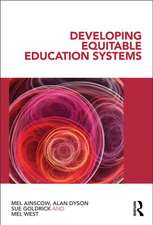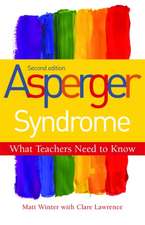Quality and Inequality of Education: Cross-National Perspectives
Editat de Jaap Dronkersen Limba Engleză Paperback – 7 noi 2014
| Toate formatele și edițiile | Preț | Express |
|---|---|---|
| Paperback (1) | 629.83 lei 6-8 săpt. | |
| SPRINGER NETHERLANDS – 7 noi 2014 | 629.83 lei 6-8 săpt. | |
| Hardback (1) | 635.95 lei 6-8 săpt. | |
| SPRINGER NETHERLANDS – 29 mai 2010 | 635.95 lei 6-8 săpt. |
Preț: 629.83 lei
Preț vechi: 740.97 lei
-15% Nou
Puncte Express: 945
Preț estimativ în valută:
120.58€ • 125.33$ • 99.97£
120.58€ • 125.33$ • 99.97£
Carte tipărită la comandă
Livrare economică 06-20 februarie 25
Preluare comenzi: 021 569.72.76
Specificații
ISBN-13: 9789400792425
ISBN-10: 9400792425
Pagini: 344
Ilustrații: VIII, 336 p.
Dimensiuni: 155 x 235 x 18 mm
Greutate: 0.49 kg
Ediția:2010
Editura: SPRINGER NETHERLANDS
Colecția Springer
Locul publicării:Dordrecht, Netherlands
ISBN-10: 9400792425
Pagini: 344
Ilustrații: VIII, 336 p.
Dimensiuni: 155 x 235 x 18 mm
Greutate: 0.49 kg
Ediția:2010
Editura: SPRINGER NETHERLANDS
Colecția Springer
Locul publicării:Dordrecht, Netherlands
Public țintă
ResearchCuprins
The Gordian Knit Between Quality and Inequality of Education: A Cross-National Attempt to Unraveling.- I Institutional arrangements and educational outcomes.- The Influence of Educational Segregation on Educational Achievement.- Institutional Tracking and Achievement Growth: Exploring Difference-in-Differences Approach to PIRLS, TIMSS, and PISA Data.- Educational Expansion and Social Class Returns to Tertiary Qualifications in Post-communist Countries.- II Migration and educational inequality..- Educational Gaps Between Immigrant and Native Students in Europe: The Role of Grade.- How Do School Regimes Tackle Ethnic Segregation: Some Insights Supported in PISA 2006.- The Educational Attainment of Second Generation Immigrants from Different Countries of Origin in the EU Member-States.- Talking the Same Language: How Does Education in the Mother Tongue Affect the Pupils’ Scholastic Achievement in the Parallel School Systems?.- III Education in Europe & Asia: analogies and differences.- The Intergenerational Transmission of Income and Education: A Comparison of Japan and France.- Japanese and Korean High Schools and Students in Comparative Perspective.- Family Background, School System and Academic Achievement in Germany and in Japan.- Features of Educational Systems as Factors in the Creation of Unequal Educational Outcomes.
Textul de pe ultima copertă
This cogent analysis of data on education and society from a variety of sources sets out to provide answers to scientific and policy questions on the quality of education and the way it relates to various forms of inequality in modern societies, particularly in Europe. The authors examine not only the well known cross-national PISA datasets, but also the European Social Survey and TIMSS, going further than many researchers by folding into their analyses economic, legal and historical factors. Most research up to now using the PISA data is restricted to educational research. Interesting as that educational question is, the chapters here use the PISA, and other data, to explore more profoundly the relationship between education and the various forms of inequality in European and other modern societies. The work comes from two different perspectives: one that looks at how the different characteristics of societies, their economies, and their educational systems influence the average educational achievements of specific groups of pupils, such as immigrants, in those societies; and a second, which explores how, and in what degree, the characteristics of schools, educational systems and labour-markets either hardens or softens differences in the educational outcomes of various groups of pupils. With a special feature of the book being its emphasis on comparing Asian and European countries, and with the content free of the political constraints that can often attend studies of these datasets, this book will be an vital resource for educationalists and policy-makers alike.
Caracteristici
Analyses the PISA en ESS data without political constrains on questions or outcomes Compares Asian and European countries Pays special attention to immigrants' educational outcomes
















